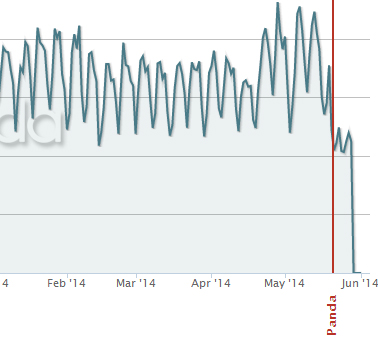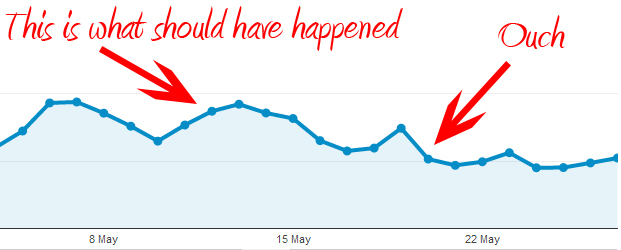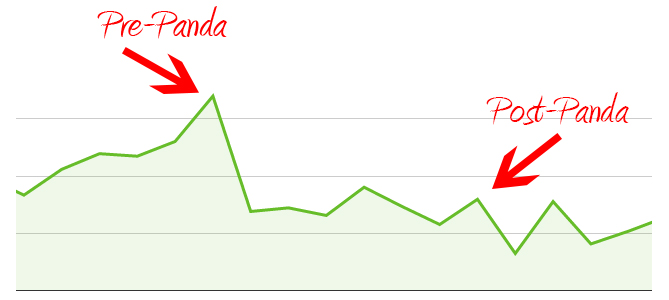Since May 20th, I really don’t like pandas anymore. Even seeing them on TV makes me shudder. Why? Because May 20th was the day I got hit by Panda 4.0. Those who got hit with me can probably spell this now famous tweet by Matt Cutts word for word. Matt is the head of spam at Google, and his tweets are feared by many.
A little bit of background information
So what’s the deal with these pandas? Well, Google is obviously inspired by the zoo for coming up with cute animals to name their algorithm updates after. Panda updates are used for flushing low quality sites (content farms) out of the search results. There’s also Penguin, which does the same for low quality backlinks.
Originally intended to improve the overall search results quality, nowadays the Panda updates are mostly used to fix previous mistakes.
So what makes Panda 4.0 so special?
First of all, a fairly high number of sites got hit. About 7.5% of English queries were affected, which is a lot. Previous updates were around 1-2%.
But what makes this one even more special is that almost immediately people in the industry began suspecting a correction or even a rollback would follow soon. And it turns out they were at least partially right.
Why this suspicion you might ask? Well, in many cases the updates didn’t really make sense at all. High-quality content pages were pushed down in favor of lower-quality ones. Quality is of course subjective, but you know good content when you see it.
This doesn’t mean the update was useless at all, there were some pretty good shifts seen. Poor ol’ eBay got hit pretty hard, losing around 35% of its search engine traffic (although rumors suggest this action was manual…).
But they got hit on exactly those (low quality, built for search queries) pages Google doesn’t want in their results. Google: 1 – eBay: 0.
How does it feel getting hit?
As I mentioned, I got hit by Panda 4.0. Of the sites I own, my money-maker took a dive, while some smaller sites gained a bit. Unfortunately not enough to compensate.
Let me start by saying that I am not a “victim” and I am not trying to defend my sites or myself. I am certainly not saying I’m only contributing high quality content to the web, but there are many pieces that stick out. I won’t mention these sites in this article, to protect them, but they are easy to find.
As a web publisher profiting from search engine traffic I need to play by Google’s rules or not play at all. Even when they keep changing the rules during the game.

I believe I can offer a good insight in getting hit by a main update. I am not a virgin to this situation either. About 18 months ago one of my sites got shot into oblivion by Penguin 1.2, crawled up a bit and received the final blow by Penguin 2.0. It was totally deserved though — I sure knew how to do some bad link building.
My main site is a great example of the indecisiveness Google has shown with the latest update. I had a number of high-ranking pages that Google initially found worthy enough of these top spots. I didn’t do any specific link building to get these pages there.
Then all of a sudden: Bang! Rankings dropped, visitor numbers dropped, and most importantly: my income dropped, even harder. Turns out the pages getting hit had a relative large share in the earnings, more than those keeping their rankings.
Pictures are worth a thousand words, so here a impression of how it looks:

The excellent Panguin tool shows what happened at a glance.

Thanks to the different scale used in this graph, it doesn’t look that bad in Google Analytics.

Google Adsense is where it hurts the most. It hurts even more knowing this was on track to being a record-breaking month.
All in all I lost about 30% of my traffic, and 40% of my income in one blow. If that doesn’t ruin your day…
It can’t be all bad right?
There were some positive effects though. One of my content sites jumped up by almost 100%. It’s still low in visitor numbers, but rewarding nonetheless. This one I do understood, since it offers excellent content Google should love, if I may say so myself.
Many webmasters like me are seeing these positive effects on their own high quality sites. Sites they worked on for months or even years, trying to become the authority on a specific topic. These guys finally got rewarded for providing good content, and that’s basically what Panda 4.0 is all about.
On a side note: I also noticed the same positive effect for a WooCommerce demo site. I intentionally included the link for this site so you can decide for yourself whether you find this a high-quality site.
The new reality
I must admit I saw this coming for months. The pages that got hit the hardest were mostly category pages, basically offering no content other than excerpts.
But even my more content rich pages got hit a little, dropping mostly one position. I “lost” my rankings to different sites offering better or similar content, so no biggie.
The site I am constantly referring to is a job information site. You will find job descriptions, salary information and job requirements. All content, with a few ads from job listing sites, but not offering job listings itself. It’s a niche site, with no direct competitors.
You might have guessed that for those pages that got dropped several places, a new contender (or contenders) replaced them. At least someone offering similar or better information.
Guess again: I got replaced by… job sites. Just plain and simple job search engines displaying a job listing page relevant to the search queue. Basically the same as what eBay was doing. That’s as high-quality as my WooCommerce demo site…
I’m not the only one seeing this strange shift. Tons of webmasters are seeing the same results, their high-quality pages being replaced by low-quality automated pages. And that’s where the suspicion that a correction or rollback was imminent began to arise.
What can we learn from all this?
If there’s anything to learn from this Panda update, it’s that Google prefers longer, broader posts over the shorter, more targeted ones. Also, although there are some exceptions, they really don’t like pages consisting of tons of links. More importantly, they are actively enforcing these policies.
Even though quality is subjective, length is not. Length can be a measurement of quality, though. Google surely knows how to measure the length of your content area. While this doesn’t necessarily guarantee a better quality, they have enough additional tools to see how a page performs (hello, Google Analytics).
So if you got hit by Panda, or want to please Google in the future, make sure you focus on quality. Use a healthy combination of content and links, and make sure people stick for a few minutes so Google now your page is worth sending visitors to.
Everyone is always saying that you should focus on what your visitors want to read, not what Google likes. But this wasn’t always the case, and you could play the game by bending the rules a bit. If you got hit by this update, you should either bend harder or finally give in to their rules.
Panda 4.0: One week later
Google has rolled back or corrected previous updates before, by churning out even more updates. Why and how they do this will always remain a mystery, but it helps to exercise a little bit of patience first after a major update.
Looking at my own rankings, traffic and earnings it seems I’m recovering a bit. It’s all rising again, back to it’s original position. It’s too soon to tell if this a correction at work, but it looks promising at least.
Most of the time, Google isn’t announcing these updates, to make it harder for spammers to know what hit them. But it seems more and more webmasters are seeing the same corrections, returning back to their original rankings. Things are still shifting quite heavily, but we’ll only know for sure in a month or so.
Rounding up
In some way I’m glad I got hit by this Panda update. I am in the process of building an even bigger job information site. I had just decided I would go with smaller pages in a series instead of fewer large posts to get more search engine traffic. Luckily I had built just a few pages, but I’m now going to be sure to combine these into 1 or 2 high quality pages per topic.
I still want to play Google’s game, even though this constant rule changing gets more and more annoying. Just never forget that in the end, the game is totally theirs.
 Jacco Blankenspoor
Jacco BlankenspoorJacco Blankenspoor is a website developer from the Netherlands, and is currently just building lots of different websites. When he is not working on HIPAAHQ.com you might catch him grinding coffee.




